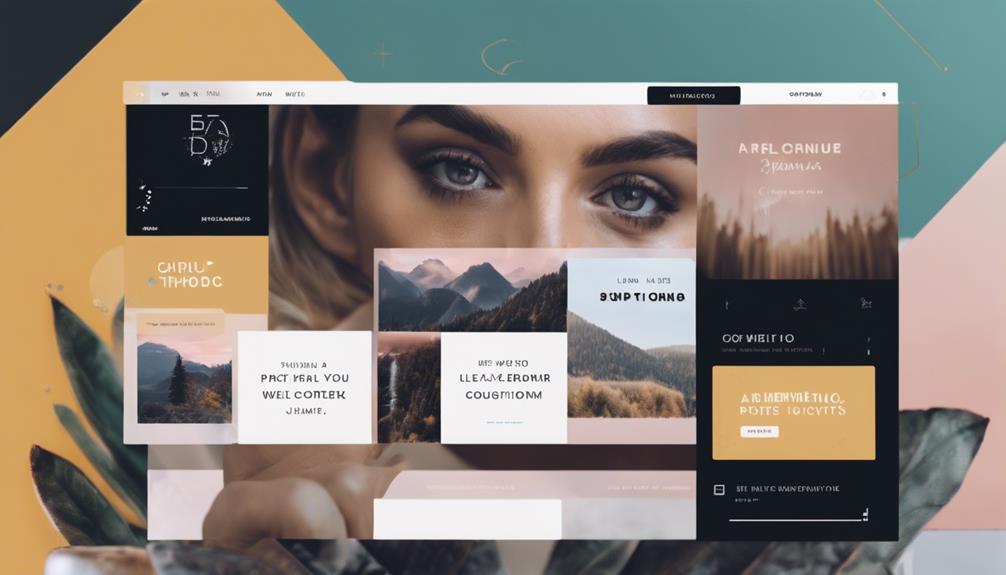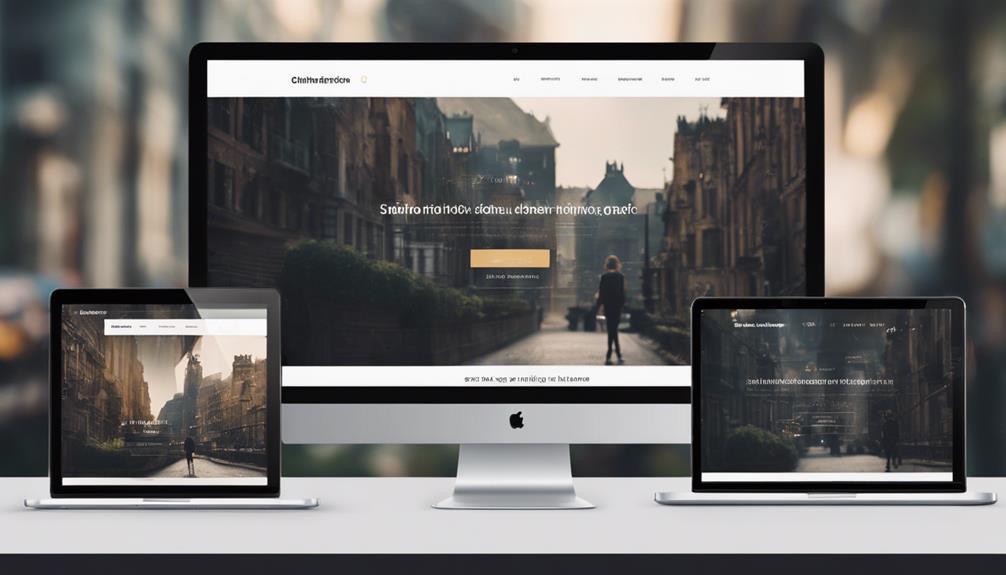In the realm of web design, having the right tools can make all the difference in creating visually captivating and functional websites. With a myriad of options available, it can be overwhelming to choose the best software for your projects.
However, with a careful selection of free web design tools, you can elevate your website aesthetics without breaking the bank. From intuitive graphic design platforms to user-friendly website builders, these tools offer endless possibilities for crafting stunning digital experiences.
But what makes these tools stand out from the rest?
Canva: Graphic Design Made Easy

Canva offers a user-friendly platform for creating professional-grade graphic designs effortlessly. This free web design software tool is a go-to choice for individuals, businesses, and even creative web design agencies looking to produce visually appealing content without the need for extensive graphic design skills. With Canva, users have access to a wide range of templates, graphics, and tools that make graphic design made easy. Whether designing social media posts, marketing materials, presentations, or even website elements, Canva provides the flexibility and functionality needed to bring creative ideas to life.
One of the key advantages of Canva is its intuitive drag-and-drop interface, allowing users to easily manipulate elements on the canvas without the complexities of traditional design software. Additionally, the platform offers collaboration features, making it ideal for teams working on design projects together. Overall, Canva simplifies the graphic design process and empowers users to create professional-quality designs with ease.
Elementor: Drag-and-Drop Website Builder
Elementor stands out as a powerful drag-and-drop website builder that streamlines the process of creating visually stunning websites with ease and efficiency. This web design software tool is highly popular among web designers and developers due to its user-friendly interface and robust features. Elementor allows users to customize every aspect of their website design without needing to write a single line of code. With its intuitive drag-and-drop functionality, users can easily add elements, adjust layouts, and preview their changes in real-time.
Whether you are a beginner looking to create a simple website or a professional designer working on a complex project, Elementor provides the flexibility and tools needed to bring your vision to life. This innovative web design software empowers users to create responsive and dynamic websites that captivate visitors and enhance user experience. Overall, Elementor is a valuable tool in the arsenal of any web designer striving to build stunning websites efficiently and effectively.
GIMP: Powerful Image Editing Tool

GIMP, renowned for its powerful features and versatility, is a leading image editing tool utilized by professionals and enthusiasts alike. When it comes to free web design tools, GIMP stands out for its extensive capabilities in editing and manipulating images for websites. With GIMP, users can create stunning graphics, retouch photos, and design visual elements that enhance the overall look and feel of a website.
As a key player in the realm of free web design, GIMP provides a range of tools and functionalities that cater to the diverse needs of web designers. From layer manipulation to advanced image editing techniques, GIMP offers a robust platform for creating captivating visuals that elevate the design of a website. Its user-friendly interface and support for various file formats make it a preferred choice for many individuals looking to enhance their web design projects without breaking the bank.
WordPress: Popular CMS for Websites
A widely recognized content management system (CMS) for websites, WordPress offers a user-friendly platform for creating and managing online content. With its intuitive interface and extensive range of customizable themes and plugins, WordPress has become a top choice for individuals, businesses, and web design agencies looking to establish a professional online presence.
WordPress web design has evolved over the years to keep up with the latest web design trends, ensuring that websites created on this platform are modern, responsive, and visually appealing. Whether you are a beginner or an experienced web designer, WordPress provides the tools and flexibility needed to bring your creative vision to life.
Web design agencies often leverage WordPress's capabilities to deliver high-quality websites to their clients efficiently. By utilizing the platform's robust features and seamless integration options, web design agencies can streamline their workflow and produce stunning websites that meet the demands of today's digital landscape.
Bootstrap: Front-End Framework for Development

Bootstrap, a powerful front-end framework for development, offers a comprehensive set of tools and resources to streamline the process of creating responsive and visually appealing websites. Web design companies frequently utilize Bootstrap due to its ability to expedite the development process while ensuring a high level of quality and consistency in design. By leveraging the pre-built components and responsive grid system provided by Bootstrap, developers can focus on customizing the look and feel of the website rather than starting from scratch. This framework also facilitates mobile-first development, ensuring that websites are optimized for viewing on various devices.
Bootstrap's popularity among web design companies can be attributed to its flexibility and ease of use. The extensive documentation and community support further enhance its appeal, making it accessible to developers of all skill levels. Whether you are building a simple landing page or a complex web application, Bootstrap's robust features and customization options make it a valuable tool in the arsenal of modern web designers.
Inkscape: Vector Graphics Editor
An essential tool for graphic designers and illustrators, Inkscape is a powerful vector graphics editor that enables the creation of scalable and precise artwork for various design projects. In the realm of web design, Inkscape plays a crucial role in crafting visually appealing websites. Its robust features empower designers to produce high-quality graphics that enhance the overall user experience. Whether designing logos, icons, or illustrations for a website, Inkscape provides the tools needed to bring creative web design ideas to life.
With Inkscape, graphic designers can manipulate shapes, text, and images with precision, ensuring that every element on a webpage is visually engaging. The software's ability to work with scalable vector graphics (SVG) makes it ideal for creating graphics that seamlessly adapt to different screen sizes, a fundamental aspect of modern web design. By leveraging Inkscape's capabilities, designers can elevate the aesthetic appeal of their websites and deliver a memorable user experience that resonates with visitors.
Frequently Asked Questions
Are These Free Web Design Software Tools Suitable for Beginners With No Prior Design Experience?
For beginners with no prior design experience, free web design software tools can be suitable to start learning. These tools often offer user-friendly interfaces, tutorials, and templates that can help individuals ease into the world of web design.
Can These Tools Be Used to Create E-Commerce Websites With Shopping Cart Functionality?
Yes, these free web design software tools can be used to create e-commerce websites with shopping cart functionality. They offer user-friendly interfaces and templates that simplify the process, making it accessible for beginners without prior design experience.
Do These Tools Offer Mobile Responsiveness for Websites to Be Easily Viewed on Different Devices?
Mobile responsiveness in web design ensures that websites adapt to various devices for optimal viewing experience. It's crucial for reaching a wider audience and improving user engagement. Incorporating this feature enhances accessibility and usability across different platforms.
Are There Any Limitations or Restrictions in Using the Free Versions of These Software Tools?
In utilizing free versions of software tools, users may encounter limitations such as restricted access to advanced features, limited storage capacity, and branding requirements. Understanding these restrictions is crucial in making informed decisions.
Can These Tools Be Integrated With Other Platforms or Software for Additional Features and Functionality?
Integrating these tools with other platforms or software for enhanced features and functionality is possible. By exploring compatibility and utilizing APIs or plugins, users can extend capabilities and create a more dynamic web experience.










